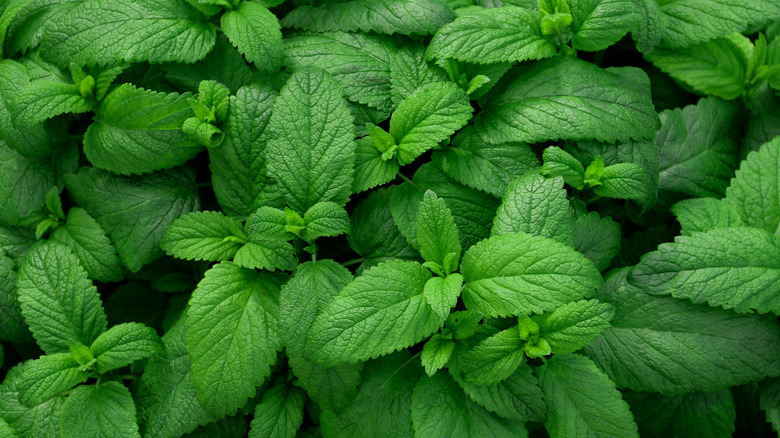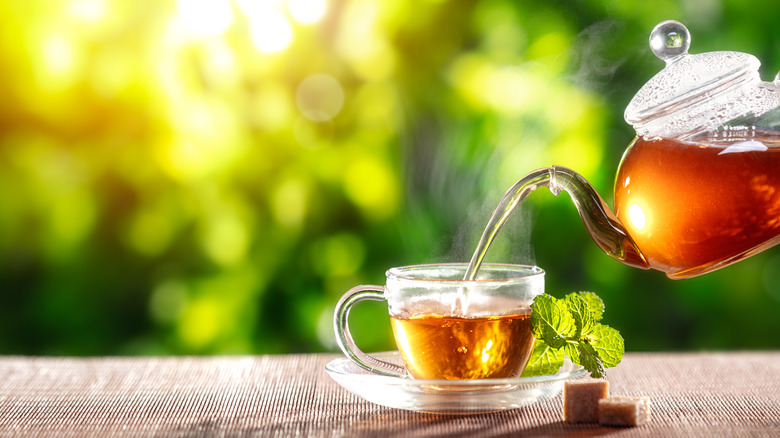Why You May Want To Start Drinking Peppermint Tea After Dinner
Throughout much of the world — and human history — mint leaves are beloved for their refreshing taste. It's no wonder that brewing mint leaves as a tea, often enjoyed after a meal is ubiquitous for its digestive and soothing properties. Mint originally hails from the Middle East and Europe, reports WebMD, and using peppermint dates back to ancient Greece and Egypt.
Today, peppermint tea is still an easy and comforting way to close a meal. You can make the warm brew by combining homegrown or store-bought mint leaves and hot water or by using pre-packaged tea bags. While cultures worldwide use peppermint tea for its healing properties, current scientific studies of peppermint are few and far between, writes Medical News Today. That said, we have some scientific evidence that shows that the essential oils found in peppermint leaves can alleviate the symptoms of many common ailments, making peppermint tea an excellent ritual to follow dinner.
Peppermint may freshen breath and ease colds
For many, peppermint is a refreshing flavor and a welcomed palate cleanser after meals, as evidenced by after-dinner mints, gum, and minty desserts. On a scientific level, peppermint is antibacterial. Peppermint oil — released by mint leaves — could help kill gum-disease-causing bacteria and freshen breath, per a 2015 review cited in Medical News Today. Furthermore, a 2017 study showed that gargling peppermint oil and a few other essential oils reliably improved breath. While neither of these studies focuses on peppermint consumed in tea form, they could suggest peppermint tea benefits our mouths beyond taste.
Additionally, peppermint oil's antibacterial qualities could come in handy when treating a cold. Inhaling peppermint oil through steam could help ease upper respiratory infections, suggests a 2016 study. Some think that peppermint tea's steam could produce the same effects. This benefit may be because peppermint leaves contain the essential oil menthol, which people can use as a decongestant. So, a cup of tea after dinner during the winter cold or spring allergy seasons could help ease seasonal stuffed-up noses, according to WebMD.
Peppermint tea could relax muscles
People have used peppermint tea throughout history to ease digestion and get rid of bloating; both often desired after a hearty meal. While few scientists have studied peppermint tea specifically, researchers have looked at the oil, reports WebMD. Results show that peppermint oil can ease irritable bowel syndrome symptoms in people. Studies performed on animals revealed that peppermint oil relaxes the digestive system, and relieves uncomfortable cramping, states Healthline. These initial scientific studies may possibly back up the thousands of years that humans have used peppermint tea to soothe upset stomachs and aid digestion.
Furthermore, peppermint tea's relaxing qualities could extend to headache relief. In 2016, a study linked peppermint oil to easing muscle tension and pain, suggesting that peppermint tea could soothe headaches, writes Medical News Today. However, scientists have not yet performed definitive research. Additionally, when applied topically, menthol is known for its cooling and tingling sensation that relaxes skin and nearby muscles. It also aids blood flow, which could also help with headaches (via Healthline).
For those who menstruate, peppermint tea could ease cramps because of its relaxing properties. A small study of individuals experiencing menstrual cramps showed that peppermint oil capsules helped relieve some of their symptoms (per a 2016 study). Peppermint tea may provide a similar effect.
Peppermint tea might help with sleep
Peppermint tea is an excellent evening beverage because it doesn't contain caffeine. Furthermore, drinking peppermint tea may help ease you into rest because of its relaxing properties. However, no research supports this theory, says Healthline.
While it's difficult to overdo peppermint tea, some medical conditions and medications can negatively interact with peppermint tea, warns WebMD. Those with heartburn, low blood pressure, diabetes, kidney stones, or those taking cyclosporine, among other medications, should avoid peppermint tea or consult their doctors before consuming it.
Registered nutritionist Nicola Shubrook reminds peppermint tea enthusiasts that if you're buying it, make sure it's 100% peppermint. She also recommends looking for plastic-free and compostable tea bags to ensure that your tea drinking pleasures sustain rather than harm the environment (via BBC). In this way, you can responsibly follow in the footsteps of those who, for centuries, have intuited peppermint tea's many benefits. A cup of brewed mint leaves makes for a simple self-care ritual and soothing practice to end a meal with loved ones or to close out the day.



